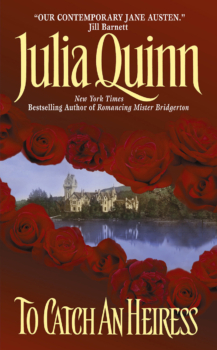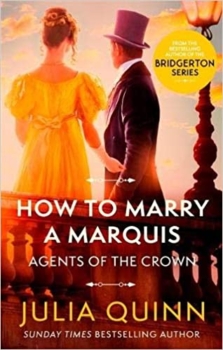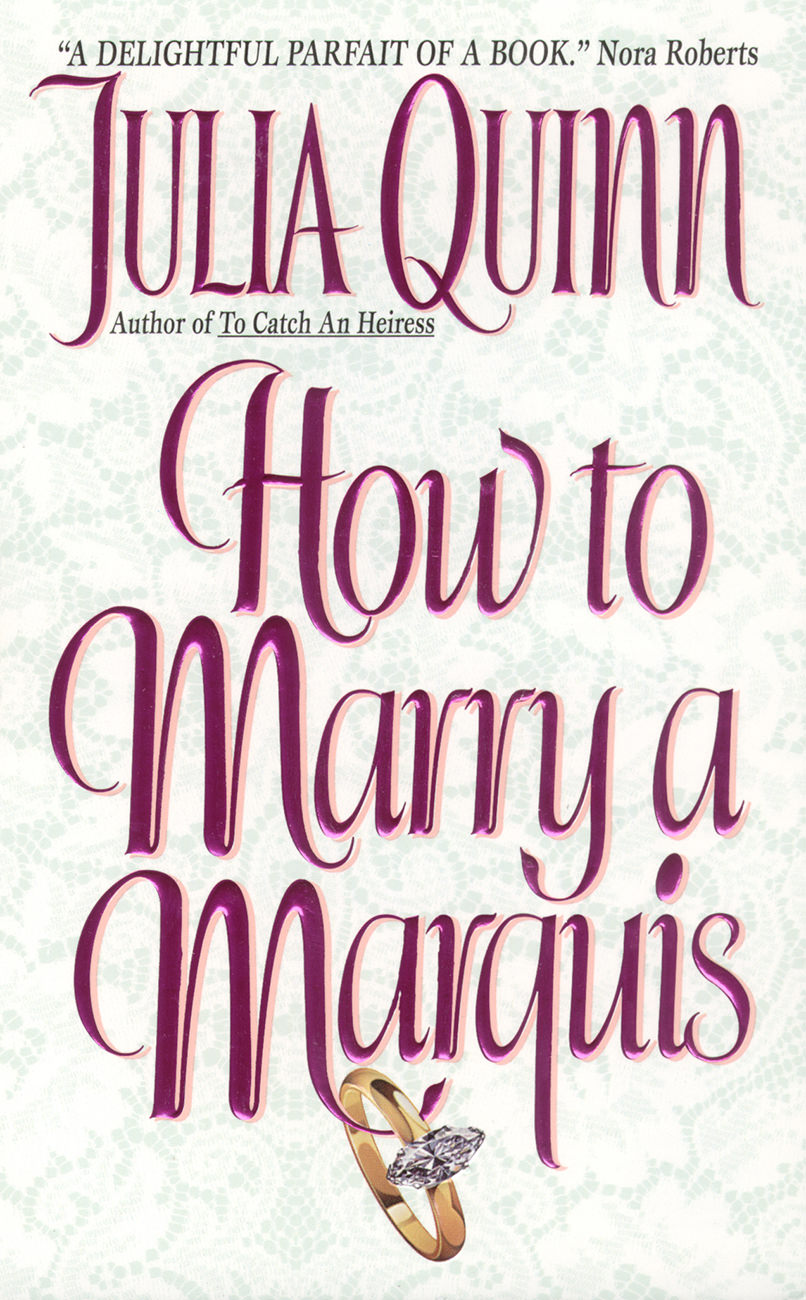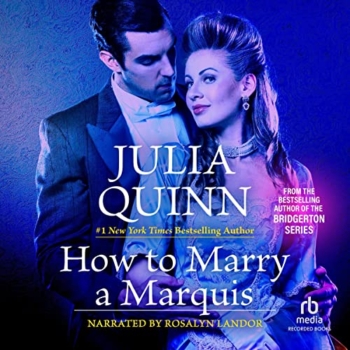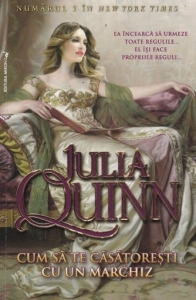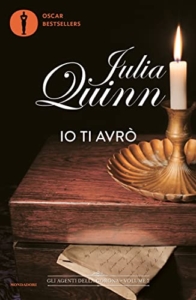How to Marry a Marquis
Book 2 in the
Agents of the Crown
She’s trying to follow the rules…
When Elizabeth Hotchkiss stumbles upon a copy of How to Marry a Marquis in her employer’s library, she’s convinced someone is playing a cruel joke. With three younger siblings to support, she knows she has to marry for money, but who might have guessed how desperate she’s become? A guidebook to seduction might be just the thing she needs—and what harm could there be in taking a little peek?
…But he’s making his own
James Sidwell, the Marquis of Riverdale, has been summoned to rescue his aunt from a blackmailer, a task that requires him to pose as the new estate manager, and his primary suspect is his aunt’s companion, Elizabeth. Intrigued by the alluring young woman with the curious little rulebook, he gallantly offers to help her find a husband… by practicing her wiles on him. But when practice becomes all too perfect, James decides that there is only one rule worth following—that Elizabeth marry her marquis.
The second of a funny, fast-paced, Regency-set duet from Julia Quinn, the bestselling author of the global phenomenon Bridgerton.
 Start Reading Now
Start Reading Now
 Explore Inside this Story
Explore Inside this Story

Books in this series:
Find out more about the Agents of the Crown →
-
Quinn-tessential Quote
“Never take the credit,” Claire Hotchkiss had told her. “You’ll accomplish far more if you let him think he is the smartest, bravest, most powerful man in creation.”
-

Inside the Story:
JQ’s Author Notes- How to Marry a Marquis is a book for which the title came way before the story. And then, while I was brainstorming the book (it took so long to brainstorm I wrote To Catch an Heiress first!) America went crazy over The Rules. (If you don't know what this is, The Rules was a monster-bestseller that basically told women how to find a husband.) Suddenly I thought—What if a book like The Rules had come out in Regency?
- Other fun points of interest—the main characters are all named after old alma maters. Elizabeth Hotchkiss is named after my high school (The Hotchkiss School) and James Sidwell, Marquis of Riverdale, is a nod toward my husband's education (he went to elementary and middle school at Sidwell Friends, then transferred to The Riverdale Country School for high school when he moved to New York.) Elizabeth is also my cousin's name, and her younger sisters are named after my mom and her twin sister, Jane and Susan. Lucas (the brother) isn't named after anybody; I just liked the name!
 And lest I forget, Malcolm the cat is real. He's actually a combination of my mother's cat, affectionately known as psychokitty, and my sister's cat Malcolm (pictured at right). You can read the book and decide which cat donated the personality and which donated the looks.
And lest I forget, Malcolm the cat is real. He's actually a combination of my mother's cat, affectionately known as psychokitty, and my sister's cat Malcolm (pictured at right). You can read the book and decide which cat donated the personality and which donated the looks.- If you look hard you might find my buddy and fellow author Danelle Harmon. She's right in there with William Dunford, the hero from Minx, who makes a brief appearance (he's still a bachelor in How to Marry a Marquis, which actually takes place before Minx.)

Bonus Features
Enjoy an Excerpt
from
How to Marry a Marquis
Chapter One
Surrey, England
July, 1815
Four plus six plus eight plus seven plus one plus one plus one, mark down eight, carry the two…
Elizabeth Hotchkiss added up the column of numbers for the fourth time, came up with the same answer she’d come up with three times before, and groaned.
When she looked up, three somber faces were staring at her — the three faces of her younger siblings. “What is it, Lizzie?” nine-year old Jane asked.
Elizabeth smiled weakly as she tried to figure out how she was going to put away enough money to buy fuel to heat their little cottage that winter. “We, ah, we haven’t much in the way of funds, I’m afraid.”
Susan, who at fourteen, was closest in age to Elizabeth, frowned. “Are you absolutely certain? We must have something. When Papa was alive we always–”
Elizabeth silenced her with an urgent stare. There were a lot of things they’d had when Papa was alive, but he’d left them nothing aside from a small bank account. No income, no property. Nothing but memories. And those — at least the ones Elizabeth carried with her — weren’t the sort that warmed one’s heart.
“Things are different now,” she said firmly, hoping to put an end to the subject. “You can’t compare the two.”
Jane grinned. “We can use the money Lucas has been stuffing away in his toy soldier box.”
Lucas, the only boy in the Hotchkiss clan, yelped. “What were you doing in my things?” He turned to Elizabeth with an expression that might have been termed “glowering” had it not been gracing the face of an eight-year-old. “Is there no privacy in this household?”
“Apparently not,” Elizabeth said absently, staring down at the numbers before her. She made a few marks with her pencil as she tried to devise new methods of economy.
“Sisters,” Lucas grunted, looking excessively put out. “I am plagued with them.”
Susan peered at Elizabeth’s ledger. “Can’t we shuffle some of the money about? Do something to stretch it a bit further?”
“There’s nothing to stretch. Thank goodness the rent on the cottage is paid, or we’d be out on our ears.”
“Is it really as bad as that?” Susan whispered.
Elizabeth nodded. “We’ve enough to last the rest of the month, and then a bit more when I receive my wages from Lady Danbury, but then…” Her words trailed off, and she looked away, not wanting Jane and Lucas to see the tears pricking her eyes. She’d been caring for these three for five years, ever since she’d been eighteen. They depended on her for food, shelter, and most importantly, stability.
Jane nudged Lucas, and then when he didn’t respond, jabbed him in the soft spot between his shoulder and collarbone.
“What?” he snapped. “That hurt.”
“‘What’ is impolite,” Elizabeth said automatically. “‘Pardon’ is preferable.”
Lucas’s little mouth fell open in outrage. “It wasn’t polite of her to poke me like that. And I’m certainly not going to beg her pardon.”
Jane rolled her eyes and sighed. “You must remember that he is only eight.”
Lucas smirked back. “You’re only nine.”
“I shall always be older than you.”
“Yes, but I shall soon be bigger, and then you’ll be sorry.”
Elizabeth’s lips curved into a bittersweet smile as she watched them bicker. She’d heard the same argument a million times before, but she’d also spied Jane tiptoeing into Lucas’s room after dark and kissing him goodnight on the forehead.
Theirs might not be a typical family — it was just the four of them, after all, and they’d been orphans for years — but the Hotchkiss clan was special. Elizabeth had managed to keep the family together five years ago when her father had died, and she was damned if she let a shortage of funds tear them apart.
Jane crossed her arms. “You should give Lizzie your money, Lucas. It isn’t right to hoard it away.”
He nodded solemnly and left the room, his little blond head bowed. Elizabeth glanced back up at Susan and Jane. They were also blond, with the bright blue eyes of their mother. And Elizabeth looked just like the rest of them — a little blond army, they were, with no money for food.
She sighed again and leveled a serious stare at her sisters. “I’m going to have to marry. There is nothing else for it.”
“Oh, no, Lizzie!” Jane shrieked, jumping out of her chair and practically clambering across the table to her sister’s lap. “Not that! Anything but that!”
Elizabeth looked at Susan with a confused expression, silently asking her if she knew why Janie was so upset. Susan just shook her head and shrugged.
“It’s not that bad,” Elizabeth said, stroking Jane’s hair. “If I marry, then I shall probably have a baby of my own, and then you get to be an Auntie. Won’t that be nice?”
“But the only person who’s asked you is Squire Nevins and he’s horrid! Just horrid.”
Elizabeth smiled unconvincingly.
“I’m sure we can find someone besides Squire Nevins. Someone less… ah… horrid.”
“I won’t live with him,” Jane said with a mutinous cross of her arms. “I won’t. I’d rather go to an orphanage. Or one of those horrid workhouses.”
Elizabeth didn’t blame her. Squire Nevins was old, fat, and mean. And he always stared at Elizabeth in a way that made her break out in a cold sweat. Truth be told, she didn’t much like the way he stared at Susan. Or Jane, for that matter.
No, she couldn’t marry Squire Nevins.
Lucas returned to the kitchen carrying a small metal box. He held it out to Elizabeth. “I’ve saved one pound, forty,” he said. “I was going to use it for–” He swallowed. “Never mind. I want you to have it. For the family.”
Elizabeth took the box silently and looked in. Lucas’s one pound, forty was there, almost all in pennies and ha’pennies. “Lucas, honey,” she said gently. “This is your savings. It has taken you years to collect all of these coins.”
His lower lip quivered, but somehow he managed to expand his little chest until he stood like one of his toy soldiers. “I’m the man of the house now. I have to provide for you.”
Elizabeth nodded solemnly and moved his money into the box where she kept household funds. “Very well. We shall use this for food. Perhaps you can come shopping with me next week, and you may pick out something you like.”
“My kitchen garden should begin to produce vegetables soon,” Susan said helpfully. “Enough to feed us, and maybe a bit extra we could sell or barter in the village.”
Jane started to squirm on Elizabeth’s lap. “Please tell me you didn’t plant more turnips. I hate turnips.”
“We all hate turnips,” Susan replied. “But they’re so easy to grow.”
“Not so easy to eat,” Lucas grumbled.
Elizabeth exhaled and closed her eyes. How had they come to this? Theirs was an old, honorable family — little Lucas was even a baronet! And yet they were reduced to growing turnips — which they all detested — in a kitchen garden.
She was failing. She had thought she could raise her brother and sisters. When her father had died, it had been the most impossible time in her life, and all that had kept her going was the thought that she had to protect her siblings, keep them happy and warm. Together.
She’d fought off aunts and uncles and cousins, all of whom offered to take on one of the Hotchkiss children, usually little Lucas, who, with his title, could eventually hope to marry a girl with a nice, large dowry. But Elizabeth had refused, even when her friends and neighbors had urged her to let him go.
She’d wanted to keep the family together, she had said. Was that so much to ask?
But she was failing. There was no money for music lessons or tutors, or any of the things Elizabeth had taken for granted when she’d been small. The Lord only knew how she was going to manage to send Lucas to Eton. And he had to go. Every Hotchkiss male for four-hundred years had attended Eton. They hadn’t all managed to graduate, but they’d all gone.
She was going to have to marry. And her husband was going to have to have a lot of money. It was as simple as that.
“Abraham begat Isaac, and Isaac begat Jacob, and Jacob begat Judas…”
Elizabeth quietly cleared her throat and looked up with hopeful eyes. Was Lady Danbury asleep yet? She leaned forward and studied the older lady’s face. Hard to tell.
“…And Judas begat Phares and Zara of Thamar, and Phares begat Esrom…”
The old lady’s eyes had definitely been closed for some time now, but still, one couldn’t be too careful.
“…And Esrom begat Aram, and…”
Was that a snore? Elizabeth’s voice dropped to a whisper.
“…And Aram begat Aminadab, and Aminadab begat Naasson, and…”
Elizabeth closed the Bible and began to tiptoe backwards out of the drawing room. Normally she didn’t mind reading to Lady Danbury; it was actually one of the better parts of her position as companion to the dowager countess. But today she really needed to get back home. She had felt so dreadful leaving while Jane was still in such a tizzy about the prospect of Squire Nevins entering their little family. Elizabeth had assured her she wouldn’t marry him if he were the last man on earth, but Jane hadn’t been very confident that anyone else would ask, and–
THUMP!
Elizabeth nearly jumped out of her skin. No one knew how to produce more noise with a cane and a floor than Lady Danbury.
“I am not asleep!” Lady D’s voice boomed.
Elizabeth turned around and smiled weakly. “So sorry.”
Lady Danbury chuckled. “You’re not in the least bit sorry. Get back over here.”
Elizabeth suppressed a groan and returned to her straight-backed chair. She liked Lady Danbury. She truly did. In fact she longed for the day when she could use age as an excuse and carry on with Lady D’s signature brand of outspokenness.
It was just that she really needed to get home, and–
“You’re a tricky one, you are,” Lady Danbury said.
“I beg your pardon?”
“All those ‘begats.’ Hand-chosen to put me to sleep.”
Elizabeth felt her cheeks grow warm with a guilty blush and tried to phrase her words as question. “I don’t know what you mean?”
“You skipped ahead. We should still be on Moses and the great flood, not that begat part.”
“I don’t think that was Moses with the great flood, Lady Danbury.”
“Nonsense. Of course it was.”
Elizabeth decided that Noah would understand her desire to avoid a protracted discussion of biblical references with Lady Danbury and shut her mouth.
“At any rate, it matters not who got caught in the flood. The fact of the matter is that you skipped ahead just to put me to sleep.”
“I… ah…”
“Oh, just admit it, girl.” Lady Danbury’s lips spread into a knowing smile. “I admire you for it, actually. Same thing I would have done at your age.”
Elizabeth rolled her eyes. If this wasn’t a case of “damned if you do and damned if you don’t” she didn’t know what was. So she just sighed, picked up the Bible and said, “What portion would you like me to read?”
“None of it. Bloody boring it is. Haven’t we anything more exciting in the library?”
“I’m sure we must. I could check, if you like.”
“You do that. But before you go, could you hand me that ledger? Yes, that one on the desk.”
Elizabeth rose, walked over to the desk, and picked up the leather-bound ledger. “Here you are,” she said, handing it to Lady Danbury.
The countess flipped the ledger open with military precision before looking back up at Elizabeth. “Thank you, my girl. I’ve a new estate manager arriving today and I want to get all these numbers memorized so I can be sure he isn’t robbing me blind in a month’s time.”
“Lady Danbury,” Elizabeth said with the utmost sincerity, “even the devil wouldn’t dare to rob you blind.”
Lady D thumped her cane by way of applause and laughed. “Well said, my girl. So nice to see a young one with a brain in the head. My own children– Well, bah, I’m not going to get into that now except to tell you that my son once got his head caught between the bars of the fence ’round Windsor Castle.”
Elizabeth clapped her hand over her mouth in an effort to stifle a laugh.
“Oh, go ahead and giggle,” Lady Danbury sighed. “I’ve found that the only way to avoid parental frustration is to view him a source of amusement.”
“Well,” Elizabeth said carefully, “that does seem a wise course of action…”
“You’d make a fine diplomat, Lizzie Hotchkiss,” Lady Danbury chortled. “Where’s my baby?”
Elizabeth didn’t even bat an eyelash. Lady D’s abrupt changes of subject were legendary. “Your cat,” she emphasized, “has been sleeping on the ottoman for the last hour,” she said, pointing across the room.
Malcolm lifted his furry head, tried to focus his slightly crossed blue eyes, decided it wasn’t worth the effort, and settled back down.
“Malcolm,” Lady Danbury cooed, “come to Mama.”
Malcolm ignored her.
“I have food.”
The cat yawned, recognized Lady D as his primary source of food, and hopped down.
“Lady Danbury,” Elizabeth scolded, “you know that cat is too fat.”
“Nonsense.”
Elizabeth shook her head. Malcolm weighed at least a stone, and half of that was fur. She spent the better part of every evening after she returned home de-furring her clothing.
Which was really quite remarkable, since the snotty beast hadn’t deigned to let her hold him in five years.
“Good kitty,” Lady D said, holding out her arms.
“Stupid cat,” Elizabeth muttered as the ecru colored feline stopped, stared at her, then went on its way.
“You’re such a sweet thing.” Lady D rubbed her hand against his furry belly. “Such a sweet thing.” The cat stretched out on Lady Danbury’s lap, lying on his back with his paws hanging over his head.
“That isn’t a cat,” Elizabeth said. “It’s a poor excuse for a rug.”
Lady D raised a brow. “I know you’re just saying that to tease me, Lizzie Hotchkiss.”
“No, I’m not.”
“Nonsense. You love Malcolm.”
“Like I love Attila the Hun.”
“Well, Malcolm loves you.”
The cat lifted its head, and Elizabeth would swear it stuck its tongue out at her.
Elizabeth stood, letting out an indignant squeak. “That cat is a menace. I’m going to the library.”
“Good idea. Go find me a new book.”
Elizabeth headed for the door.
“And nothing with ‘begat!'”
Elizabeth laughed in spite of herself and headed across the hall to the library. The clicking sound of her footsteps disappeared as she stepped onto the carpet, and she sighed. Good heavens, there were a lot of books here. Where on earth to start?
She selected a few novels, then pulled down a collection of Shakespeare’s comedies. A slim volume of romantic poetry joined the pile, and then, just as she was about to cross the hall back to Lady D’s drawing room, another book caught her eye.
It was very small, and bound in quite the brightest red leather Elizabeth had ever seen. But what was most odd about the book was that it was sitting sideways on a shelf in a library that gave new meaning to the word “order.” Dust wouldn’t dare settle on these shelves, and certainly no book would ever lie sideways.
Elizabeth set down her pile and picked up the little red book. It was upside down, so she had to flip it over to read the title.
She dropped the book, half expecting lightning to strike her, right there in the library. Surely this had to be some kind of joke. She’d only decided that afternoon that she had to marry, and well.
“Susan?” she called out. “Lucas? Jane?”
She shook her head. She was being ridiculous. Her siblings, cheeky as they may be, would not sneak into Lady Danbury’s house and deposit a fake book, and–
Well, actually, she thought, turning the slim red volume over in her hand, when it came right down to it, the book didn’t really look fake. The binding looked sturdy, and the leather on the cover appeared to be of high quality. She glanced around to make sure that no one was watching — although she wasn’t quite certain why she should feel so embarrassed– and carefully opened it to the first page.
The author was a Mrs. Seeton, and the book had been printed in 1792, the year of Elizabeth’s birth. A funny little coincidence, Elizabeth decided, but she wasn’t a superstitious sort of person. And she certainly didn’t need a little book to tell her how to live her life.
Besides, when it came right down to it, what did this Mrs. Seeton really know? After all, if she had married a marquis, wouldn’t she be Lady Seeton?
Elizabeth slammed the book shut decisively and returned it to its spot on the shelf, making certain that it laid sideways, just the way she had found it. She didn’t want anyone to think she’d actually been looking at the silly thing.
She picked up her stack of books and crossed back to the drawing room, where Lady Danbury was still sitting in her chair, stroking her cat and staring out the window as if she were waiting for someone.
“I found some books,” Elizabeth called out. “I don’t think you’ll find many ‘begats’ in these, although perhaps in the Shakespeare…”
“Not tragedies, I hope.”
“No, I thought that in your current frame of mind, you’d find the comedies more entertaining.”
“Good girl,” Lady Danbury said approvingly. “Anything else?” Elizabeth blinked and looked back down at the books in her arms. “A couple of novels, and some poetry.”
“Burn the poetry.”
“I beg your pardon?”
“Well, don’t burn it; the books are certainly more valuable than firewood. But I certainly don’t want to hear it. My late husband must have bought that. Such a dreamer.”
“I see,” Elizabeth said, mostly because she thought she was expected to say something.
With a sudden movement, Lady Danbury cleared her throat and waved her hand in the air. “Why don’t you go home early today?”
Elizabeth’s mouth dropped open. Lady Danbury never dismissed her early.
“I have to deal with that blasted estate manager, and I certainly don’t need you here for that. Besides, if he’s an eye for pretty young girls, I’ll never get him to pay attention to me with you around.”
“Lady Danbury, I hardly think–”
“Nonsense. You’re quite an attractive thing. Men love blond hair. I should know. Mine used to be as fair as yours.”
Elizabeth smiled. “It still is fair.”
“It’s white, is what it is,” Lady Danbury said with a laugh. “You’re a sweet thing. You shouldn’t be here with me, you should be out finding a husband.”
“I… ah…” What to say to that?
“Very noble of you to devote yourself to your siblings, but you have to live as well.”
Elizabeth just stared at her employer, horrified by the tears pooling in her eyes. She’d served Lady Danbury for five years, and never had they spoken of such matters.
“I’ll– I’ll be off, then, since you say I might leave early.”
Lady Danbury nodded, looking oddly disappointed. Had she been hoping Elizabeth would pursue the topic further? “Just put that book of poetry back before you go,” she instructed. “I’m sure I won’t look at it, and I can’t trust the servants to keep my books in order.”
“I will.” Elizabeth set the rest of the books down on an end table, gathered her things, and said her farewells. As she was walking out of the room, Malcolm jumped off of Lady Danbury’s lap and followed her.
“See?” Lady D crowed. “I told you he loved you.”
Elizabeth eyed the cat suspiciously as she headed out into the hall. “What do you want, Malcolm?”
He flicked his tail, bared his teeth, and hissed.
“Oh!” Elizabeth exclaimed, dropping the poetry book. “You beast. Following me out here just to hiss–”
“Did you throw a book at my cat?” Lady D hollered.
Elizabeth decided to ignore the question, instead jabbing her finger in Malcolm’s direction as she snatched up her book. “Go back to Lady Danbury, you awful creature.”
Malcolm stuck his tail in the air and stalked away.
Elizabeth let out a long breath and walked into the library. She headed over for the poetry section, scrupulously keeping her back that little red book. She didn’t want to think about it, she didn’t want to look at it–
Drat, but that thing was practically giving off heat. Never in her life had Elizabeth been so aware of an inanimate object.
She reshelved the volume of poetry and stomped to the door, starting to get really annoyed with herself. That silly little book shouldn’t affect her one way or another. By avoiding it like the plague, she was actually giving it power it didn’t deserve, and–
“Oh, for heavens sake!” she finally burst out.
“Did you say something?” Lady Danbury called out from the next room.
“No! I just– Uh, I just tripped over the edge of the rug. That’s all.” Elizabeth muttered another, “Good heavens,” under her breath and tiptoed back over to the book. It was lying face-down, and much to Elizabeth’s surprise, her hand shot out and flipped it over.
There it was, same as before. Staring up at her, mocking her, sitting there as if to say she didn’t have the gumption to read it.
“It is just a book,” she muttered. “Just a stupid, garishly red, little book.”
And yet…
Elizabeth needed money so desperately. Lucas had to be sent to Eton, and Jane had cried for a week when she’d used up the last of her watercolors. And both of them were growing faster than weeds on a summer day. Jane could make do with Susan’s old frocks, but Lucas would need clothing befitting his station.
The only road to riches was marriage, and this brazen little book claimed to have all the answers. Elizabeth wasn’t so foolish as to believe that she might snag a marquis, but maybe a little advice could help her land a nice country gentleman, one with a nice comfortable income. She’d even marry a Cit. Her father would turn over in his grave at the thought of her making an alliance with someone in trade, but a girl had to be practical, and Elizabeth would wager that there were a number of wealthy merchants who’d like to marry the impoverished daughter of a baronet.
When it came right down to it, she didn’t know much about men. She didn’t know what she was supposed to say to them or how she was supposed to act to make them fall in love with her.
She stared at the book. Hard.
She looked around. Was anyone coming?
She took a deep breath, and quick as lightning, the book found its way into her reticule.
Then she ran out of the house.
James Sidwell, Marquis of Riverdale, liked to go unnoticed. He liked nothing better than to blend into a crowd, his identity unknown, and ferret out plots and facts. It was probably why he’d so enjoyed his years of work for the War Office.
And he’d been damned good at it. The same face and body that commanded such attention in London ballrooms disappeared into crowds with startling success. James merely removed the confident gleam from his eyes, stooped his shoulders, and no one ever suspected that he was of noble lineage.
Of course the brown hair and brown eyes helped, too. It was always good to have common coloring. James doubted there were very many successful red-headed operatives.
But one year earlier, his cover had been blown when a Napoleonic spy had revealed his identity to the French. And now the War Office refused to assign him to any mission more exciting than the occasional rounding up of low-stakes smugglers.
James had accepted his boring fate with a heavy sigh and an air of resignation. It was probably time he devoted himself to his estates and title, anyway. He had to marry at some point –distasteful as the prospect might be– and produce an heir to the marquisate. And so he had turned his attention to the London social scene, where a marquis –especially one so young and handsome– never went unnoticed.
James had been alternately disgusted, bored, and amused. Disgusted because the young ladies –and their mamas– viewed him as nothing so much as a large fish to be hooked and reeled in. Bored because after years of political intrigue, the color of ribbons and the cut of a waistcoat just didn’t strike him as fascinating topics of conversation. And amused because, to be frank, if he hadn’t held on to his sense of humor throughout the ordeal he would have gone mad.
When the note from his aunt had arrived by special messenger, he had nearly whooped with joy. Now, as he approached her house in Surrey, he pulled it out of his pocket and reread it.
I need your help urgently. Please report to Danbury House with all possible haste. Do not travel in your best finery. I shall tell everyone that you are my new estate manager. Your new name is James Siddons.
—Agatha, Lady Danbury
James had no idea what this was all about, but he knew it was just what he needed to alleviate his boredom and allow him to leave London without feeling guilty over shirking his duties. He traveled by hired coach, since an estate manager would not own horses as fine as his, and walked the last mile from the center of town to Danbury House. Everything he needed was packed in one bag.
In the eyes of the world, he became plain Mr. James Siddons, a gentleman, to be sure, but perhaps just a little down on funds. His clothing came from the back of his closet — well-made, but worn at the elbows and two years out of style. A few snips with the kitchen shears effectively marred the expert haircut he’d received just the week before. For all intents and purposes, the Marquis of Riverdale had disappeared, and James could not have been more pleased.
Of course his aunt’s scheme did have a major flaw, but that was only to be expected when one let amateurs do the planning. James hadn’t visited Danbury House in nearly a decade; his work for the War Office hadn’t afforded him much time to visit family, and he certainly hadn’t wanted to put his aunt in any kind of danger. But surely there was someone –some aging retainer, the butler, perhaps– who would recognize him.
But then again, people saw what they expected to see, and when James acted like an estate manager, people generally saw an estate manager.
He was nearly to Danbury House –practically on the front steps, actually– when the front door flew open and petite, blond woman came tearing out, head down, eyes to the ground, and moving just a fraction slower than the speed of light. James didn’t even have a chance to call out before she’d run right into him.
Their bodies connected with dull thump, and the girl let out a feminine squeal of surprise as she bounced off of him and landed inelegantly on the ground. A clip or ribbon or whatever it was females called those things flew from her hair, causing a thick lock of white gold hair to slip out of her coiffure and settle awkwardly on her shoulder.
“I beg your pardon,” James said, holding out his hand to help her up.
“No, no,” she replied, brushing off her skirts, “it was my fault entirely. I wasn’t looking where I was going.”
She didn’t bother to take his hand, and James found himself oddly disappointed. She wasn’t wearing gloves, and neither was he, and he felt a strange compulsion to feel the touch of her hand in his.
But he could not say such things out loud, and so he instead bent down to help her retrieve her things. Her reticule had flown open when it hit the ground, and her belongings were now strewn around their feet. He handed her her gloves, which caused her to blush.
“It’s so hot,” she explained, looking at the gloves with resignation.
“Don’t don them on my account,” he said with an easy smile. “As you can see, I have also chosen to use the fine weather as an excuse to leave them off.”
She stared at his hands for a moment before shaking her head and murmuring, “This is the oddest conversation.”
She knelt to gather the rest of her things, and James followed suit. He picked up a handkerchief and was reaching for a book when she suddenly made the strangest noise –nothing so much as a strangled cry– and snatched it out from beneath his fingers.
James found himself really wanting to know what was in that book.
She cleared her throat about six times and said, “You’re very kind to help me.”
“It was no trouble, I assure you,” he murmured, clearly trying to get a look at the book. But she’d already shoved it back into her reticule.
Elizabeth smiled nervously at him, letting her hand slip into her bag, just to reassure herself that the book was really there, hidden safely out of sight. If she was caught reading such a thing, she’d be mortified beyond words. It was a given that all unmarried women were looking for a husband, but only the most pathetic of females would be caught actually reading a manual on the subject.
He didn’t say anything, just looked her over in an assessing sort of way that made her even more nervous. Finally, she blurted out, “Are you the new estate manager?”
“Yes.”
“I see.” She cleared her throat. “Well, then I suppose I ought to introduce myself, as I’m sure our paths will cross. I am Miss Hotchkiss, Lady Danbury’s companion.”
“Ah. I am Mr. Siddons, recently of London.”
“It was very nice meeting you, Mr. Siddons,” she said with a smile that James found oddly engaging. “Terribly sorry about the accident, but I must be off.”
She waited for his acknowledging nod, then dashed off down the drive, clutching her bag as if her very life depended on it.
James just stared as she ran off, strangely unable to take his eyes off of her retreating form.
How to Marry a Marquis
by Julia Quinn
is available in the following formats:
Mass Market Paperback:
The United Kingdom:

En Español
Not ready to order yours? Check out this story's overview. Read the excerpt. Listen to a bit on audio. Find out more about the series. There’s so much to love!





